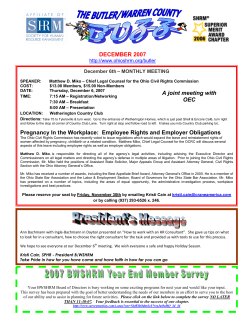
Ulysses Simpson Grant
Ulysses Simpson Grant Ulysses S. Grant came to the Presidency a great military hero. 18th President of the United States (March 4, 1869 to March 3, 1877) Nickname: "Hero of Appomattox" Born: April 27, 1822, in Point Pleasant, Ohio Died: July 23, 1885, in Mount McGregor, New York Father: Jesse Root Grant Mother: Hannah Simpson Grant Married: Julia Boggs Dent (1826-1902), on August 22, 1848 Children: Frederick Dent Grant (1850-1912); Ulysses Simpson Grant (1852-1929); Ellen Wrenshall Grant (1855-1922); Jesse Root Grant (1858-1934) Religion: Methodist Education: Graduated from the U.S. Military Academy in West Point, N.Y. (1843) Occupation: Soldier Political Party: Republican Public Service: His Vice President(s): Schyler Colfax, Henry Wilson Grants Family U.S.Grant and Julia Grant The Grant Family Julia Grant First Lady: Julia Grant, Wife Wife's Maiden Name: Julia Dent Number of Children: 4 was married to Ulysses S. Grant for nearly 37 years. Their marriage was a remarkably close one, a rich blending of two human beings until they became virtually one entity. Julia was a very plain woman and she had no illusion about her physical limitations. In 1880, she relayed a touching story to one her friends: "I used to cry when I was a little girl because I was so ugly. 'Never mind, Julia,' my dear mother would say, 'you can be my good little girl.' I used to wish I could ever once be called her 'pretty little girl.'" Grants Children: Ulysses S. Grant married Julia Boggs Dent on August 22, 1848. Children of Ulysses S. and Julia Dent Grant: Frederick Dent Grant, b. 1850. (Married Ida Marie Honore). Ulysses S. Grant, Jr. b. 1852. (Married 1. Fannie Josephine Chaffee. Married 2. America Workman Will). Ellen Wrenshall Grant (Nellie) b. 1855. (Married 1. Algernon Chas. Frederick Sartoris. Married 2. Frank Hatch Jones. Jesse Root Grant, b. 1858. (Married 1. Elizabeth Chapman. Married 2. Lillian Burns Wilkins). Presidential Election Results: Year Popular Votes Electoral Votes 1868 Ulysses S. Grant Horatio Seymour Vice Presidents: Schuyler Colfax (1869-73); Henry Wilson (1873-75) Ulysses S. Grant was a devoted family man. He and his wife Julia had four children and were fortunate not to lose any of them to an early death, as was so often in the case in those days of untreatable diseases and lack of the kind of medical care we take for granted today. They were proud of their children and the children respected them. One author observed that the whole family was "one big mutual admiration society." Chronology of the Grant children Frederick Dent Grant Born May 30, 1850 at St. Louis, Missouri. Accompanied his father in various engagements during the Civil War. Attended West Point, graduating in 1871. Married Ida Marie Honore, October 20, 1874. Children: Princess Julia Grant Cantacuzene, Ulysses S. Grant III. U.S. Minister to Austria-Hungary, 1890-1893. New York City Police Commissioner, 1895-1897. Major General, United States Army. Fought in the Spanish American War. Died in New York City, April 11, 1912. Buried with his wife at West Point. Ulysses S. Grant, Jr. Born July 22, 1852 in Bethel, Ohio. Graduated from Harvard University in 1874, and from the Law School of Columbia University in 1876. Married Fannie Josephine Chaffee in 1880. Children: Miriam, Chaffee, Julia, Fannie, Ulysses IV. Moved to California in 1893 and worked in the field of law and finance. Opened the U.S. Grant Hotel in 1910. Today it is a Four Diamond Landmark Hotel. Married Mrs. America Workman Will in 1913 after the death of his wife Fannie. Died September 26, 1929 and is buried in San Diego, California. Nellie Grant Sartoris Jones Born July 4, 1855 at Wish Ton Wish near St. Louis, Missouri. Married in a spectacular White House wedding on May 21, 1874 to Algernon Sartoris of England. Children: Algernon Edward Sartoris, Vivien May Sartoris Scovel, Rosemary Alice Sartoris Woolston. She moved to England, but the marriage proved a failure and she returned to the United States and lived with her mother until the latter's death. In 1912 she married Frank Hatch Jones, first Assistant Postmaster under President Cleveland, and lived in Chicago. A few years after her marriage to Jones she suffered a stroke and was an invalid for the rest of her life. Died in Chicago in 1922 and is buried in Oak Ridge Cemetery in Springfield, Ill. near the tomb of Abraham Lincoln. Jesse Root Grant Born February 6, 1858 at Hardscrabble, near St. Louis. Attended Cornell Univeristy, studying engineering. He also attended Columbia Law School. Married on September 30, 1880, to Elizabeth Chapman. Children: Nellie Grant Cronan, Chapman Grant. The marriage ended in divorce and on August 26, 1918 he married Lillian Burns Wilkins. Ran for the Democratic presidential nomination in 1925. Wrote the book In the Days of My Father, General Grant in 1925. Died on June 8, 1934 and is buried in San Francisco. Hannah Simpson Grant Jesse Root Grant U.S. Grants mother and father Early Years Ullysses S. Grant Grant was born in Point Pleasant, Ohio, on April 27, 1822, and baptized Hiram Ulysses. The eldest son of Jesse Root Grant and Hannah Simpson Grant, he came from a family that, he proudly declared, had been American "for generations, in all its branches, direct and collateral." In 1823 his father moved his tanning business to Georgetown, Ohio, where "Lyss" spent his boyhood. His education at a grammar school in Georgetown, at Maysville Seminary in Maysville, Ky., and at the Presbyterian Academy of Ripley, Ohio, was superficial and repetitious, and the boy showed no scholarly bent. He became noted, however, for his sturdy self-reliance and for his ability to ride and control even the wildest horses. Grant's second four years in the White House were not happy ones. A storm of scandal, which had started while the campaign was still under way, broke about his head. Leading Republican congressmen and officials were involved in railroad scandals; his whole party was implicated in the "salary grab" act (February-March 1873), which retroactively increased the pay of congressmen and the executive; and his secretary of war, William Worth Belknap, shared in Indian agency frauds. The president's private secretary, Orville E. Babcock, had a hand in the Whiskey Ring peculations, and Grant, refusing to doubt his integrity, supported him to the last. Grant himself was not involved in the corruption, but when his close advisers proved faithless, the popular conviction grew that he was a failure as president. The last years of Grant's life were sad ones. Admirers collected a fund of $250,000, which they placed in trust for him; when the securities in which the fund was invested became worthless, however, he was so hard up for money that he had to sell his wartime swords and souvenirs. He became a partner in the brokerage firm of Grant & Ward, but like all his previous business ventures, it failed (May 6, 1884) and he went into bankruptcy. A move to have him restored to the rank of general, which he had resigned to run for the presidency, met political opposition and was not approved until the last day of Chester A. Arthur's administration (March 3, 1885). Grant had only a few months to enjoy the salary that Congress thus voted him. Afflicted with a cancer of the throat, the general was heroically trying to provide for his family during these last years. The success of an article on the Battle of Shiloh, which he wrote for the Century Magazine in 1884, led him to plan writing his own account of the war in which he had played so large a part. In his sickroom at Mount McGregor near Saratoga, N. Y., he composed the two volumes of personal recollections that remain one of the great war commentaries of all times. Published by Mark Twain, the Personal Memoirs ultimately brought the Grant family nearly $450,000 in royalties. Grant himself did not live to reap the reward. Exhausted from his heroic battle, he died quietly at Mount McGregor on July 23, 1885, and his body eventually found its last resting place in the great mausoleum (dedicated 1897) in New York City overlooking the Hudson River. Fast Fact: Biography: Late in the administration of Andrew Johnson, Gen. Ulysses S. Grant quarreled with the President and aligned himself with the Radical Republicans. He was, as the symbol of Union victory during the Civil War, their logical candidate for President in 1868. When he was elected, the American people hoped for an end to turmoil. Grant provided neither vigor nor reform. Looking to Congress for direction, he seemed bewildered. One visitor to the White House noted "a puzzled pathos, as of a man with a problem before him of which he does not understand the terms." Born in 1822, Grant was the son of an Ohio tanner. He went to West Point rather against his will and graduated in the middle of his class. In the Mexican War he fought under Gen. Zachary Taylor. At the outbreak of the Civil War, Grant was working in his father's leather store in Galena, Illinois. He was appointed by the Governor to command an unruly volunteer regiment. Grant whipped it into shape and by September 1861 he had risen to the rank of brigadier general of volunteers. He sought to win control of the Mississippi Valley. In February 1862 he took Fort Henry and attacked Fort Donelson. When the Confederate commander asked for terms, Grant replied, "No terms except an unconditional and immediate surrender can be accepted." The Confederates surrendered, and President Lincoln promoted Grant to major general of volunteers. At Shiloh in April, Grant fought one of the bloodiest battles in the West and came out less well. President Lincoln fended off demands for his removal by saying, "I can't spare this man--he fights." For his next major objective, Grant maneuvered and fought skillfully to win Vicksburg, the key city on the Mississippi, and thus cut the Confederacy in two. Then he broke the Confederate hold on Chattanooga. Lincoln appointed him General-in-Chief in March 1864. Grant directed Sherman to drive through the South while he himself, with the Army of the Potomac, pinned down Gen. Robert E. Lee's Army of Northern Virginia. Finally, on April 9, 1865, at Appomattox Court House, Lee surrendered. Grant wrote out magnanimous terms of surrender that would prevent treason trials. As President, Grant presided over the Government much as he had run the Army. Indeed he brought part of his Army staff to the White House. Although a man of scrupulous honesty, Grant as President accepted handsome presents from admirers. Worse, he allowed himself to be seen with two speculators, Jay Gould and James Fisk. When Grant realized their scheme to corner the market in gold, he authorized the Secretary of the Treasury to sell enough gold to wreck their plans, but the speculation had already wrought havoc with business. During his campaign for re-election in 1872, Grant was attacked by Liberal Republican reformers. He called them "narrow-headed men," their eyes so close together that "they can look out of the same gimlet hole without winking." The General's friends in the Republican Party came to be known proudly as "the Old Guard." Grant allowed Radical Reconstruction to run its course in the South, bolstering it at times with military force. After retiring from the Presidency, Grant became a partner in a financial firm, which went bankrupt. About that time he learned that he had cancer of the throat. He started writing his recollections to pay off his debts and provide for his family, racing against death to produce a memoir that ultimately earned nearly $450,000. Soon after completing the last page, in 1885, he died. Did you know facts about Ullysses S. GRANT • • • • • • • • He was once fined $20 for speeding on his horse. He was a 39-year old clerk when he volunteered to fight for the Union. He apologized upon leaving the White House, not for errors of intent but for errors of judgment. Even though he had throat cancer, he finished his memoirs and had them published with the help of Mark Twain. He was known for being personally honest but surrounded by dishonest people. Julia Dent Grant spent the "happiest period" of her life as First Lady. After the presidency the Grants traveled around the world. During his term, the United States population was estimated to be 39 million. "The truth is I am more of a farmer than a soldier. . . .I never went into the army without regret and never retired without pleasure." • Description: Ulysses S. Grant was born in a white Allegheny pine house on the banks of the Ohio River twenty-five miles southeast of Cincinnati. The Grant family stayed in Point Pleasant for a year before moving to Georgetown, Ohio. The house is owned by the State of Ohio and maintained by the Ohio Historical Society. It is open to the public. • Grant's Birthplace; Routes 52E and 322; Point Pleasant, OH 45143 • Although General Grant was reported to be a small man, in actuality he was five feet, eight inches tall. This was above average for the mid-nineteenth century man who was about five feet, seven inches. General Grant did not start life as a small baby, however, weighing ten and three quarters pounds at birth. • Unlike many of his predecessors who were born in log cabins, Hiram Ulysses Grant was born in a small frame cottage along the banks of the Ohio River in a small village named Point Pleasant, to a leather tanner, Jesse Grant and his wife Hannah Simpson Grant on April 27, 1822. Although named Hiram, his family called him by his middle name Ulysses, or Lyss for short • At the age of seven, young Ulysses nearly drowned while fishing in White Oak Creek, near his home in Georgetown, Ohio. His friend and fishing partner, nine year old Daniel Ammen, reached down and pulled him to safety after a thorough dunking. • At nine years of age young Ulysses was so adept at breaking horses to pace that many farmers in the region came to him for assistance in training their animals. His intense love for horses continued throughout his life. He set a high jump record at West Point that lasted for more than twenty-five years. • Upon graduation, Grant had no intention of keeping the military as his career and planned instead on being a professor of mathematics. • On August 28, 1848, Grant married Julia Dent from St. Louis, whose family held slaves. Grant himself owned a slave named William Jones, acquired from his father-in-law. At a time when he could have desperately used the money from the sale of Jones, Grant signed a document that gave him his freedom. • Grant was very thin during the war, weighing only one hundred and thirty-five pounds. He was a very sparse eater. He abhorred red meat of any kind, and the sight of blood made him ill. Consequently, he insisted on his meat being cooked on the verge of being charred. He would not eat any kind of fowl, but was fond of pork and beans, fruit, and buckwheat cakes. • Grant was tone deaf and could not recognize any of the light airs of the time; military music was especially annoying to him. • Throughout his life General Grant had a superstition of retracing his steps. Throughout the war, this superstition turned into an asset in leading troops in battle. • In the heat of battle, when his staff officers were full of anxiety, Grant calmly smoked his cigar and never lost his composure. His nerves of steel were a wonder to all around him. He could write dispatches while shells burst around him and never flinch. • Since boyhood, General Grant had an aversion to any kind of profanity, noting that it was a waste of time. No off color stories were allowed to be told in his presence. • During his lifetime General Grant suffered intense migraine headaches which were sometimes reported as bouts of drunkenness. • Before the Battle of Fort Donelson, Grant was a light smoker. During the battle a reporter spotted him holding an unlit cigar given him by Admiral Foote, and soon ten thousand cigars were sent to him in camp. Although giving away as many as he could, he started the habit of cigar smoking that became one of his trademarks. • Ulysses Grant was a devoted family man and had his family with him whenever he could during the War. His oldest son Fred was with his father often. During the Battle of Black River Bridge, thirteen year old Fred was wounded when a musket ball struck him in the left thigh. • On the day Lincoln was assassinated, Grant's wife Julia was stalked by John Wilkes Booth. If the general had accepted the invitation to go to Ford's Theater with the presidential party, there may have been a double tragedy. They went instead to Burlington, New Jersey, to see their children.
© Copyright 2025
















